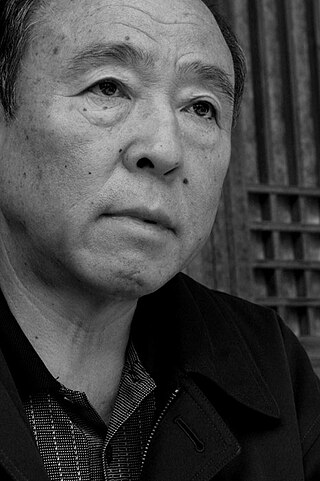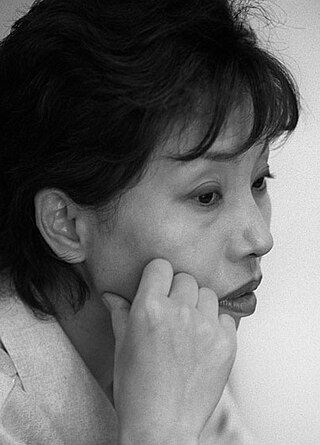Yi Mun-yol is a South Korean writer. Yi's given name at birth was Yol; the character, Mun, was added after he took up a writing career. His works include novels, short stories and Korean adaptations of classic Chinese novels as well as political and social commentaries. An informal count has estimated that over 30 million copies of his books have been sold and, as of 2021, they have been translated into 21 languages. His works have garnered many literary awards and many have been adapted for film and television.
Yoo Jae-yong was a South Korean novelist, known for his faithfulness to traditional forms and emphasis on steadfast characters.

Yun Hu-myong is a South Korean writer who has published poetry, novels, and essays.

Park Wan-suh was a South Korean writer.
Choi In-hoon was a South Korean novelist and professor of creative writing at Seoul Institute of the Arts from 1977 to 2001. He is well-known for his 1960 novel The Square, which depicts "the troubled life of a Korean prisoner of war (POW) who ends up taking his own life amid an intensified ideological rift in the post-Korean War era." He won the 2011 Park Kyong-ni Prize.

Kyung-Sook Shin, also Shin Kyung-sook or Shin Kyoung-sook, is a South Korean writer. She was the only South Korean and only woman to win the Man Asian Literary Prize in 2012 for Please Look After Mom.

Yang Gwija is a South Korean writer.

O Jeonghui (Korean: 오정희) is a South Korean writer.

Bruce Fulton is an American professor of Korean Literature and a noted translator of contemporary Korean fiction with an extensive list of publications. He has lived in the United States, Canada, and South Korea, and is married to fellow translator Ju-Chan Fulton.
Park Kyong-ni Prize is an international literary award based in South Korea. It was established in 2011 in honor of Park Kyung-ni, known for her series Toji. The award was founded and sponsored by the Toji Foundation of Culture.

Gim Yu-jeong or Kim Yu-jŏng was a Korean novelist. He is one of the famous novelists of Korea, also recognised as the icon of Chuncheon, where he was born. Gim You-jeong Literature Village and Gimyujeong Station, both located in Chuncheon was named after him.
Yun I-hyeong is a South Korean writer.
Yun Ko-eun is a South Korean writer and host of radio show "윤고은의 Book cafe," aired daily on EBS.

Ha Jaeyoun is a South Korean poet and professor. Born in Seoul, South Korea, she studied Korean literature at Korea University and earned her master's and doctoral degrees at the same institution. She has published two poetry collections since debuting in 2002. She was a visiting scholar at George Mason University, research professor at Korea University, post-doctoral researcher at Hanyang University, and is currently a research professor at the Wonkwang University Institute of Humanities. She is a member of the poetry group Inconvenience and the independent magazine Clearing Snow.
Park Ra Yeon is a South Korean poet.
Kim Nyeon-gyun is a Korean poet. Since his debut in 1972, he has been active as a poet, writer, and essayist. He has also served various Korean literary organizations, such as being a board member of the Korean Centre of PEN International and the board director of the Korean Writers' Association. Kim's poetry depicts lives of pain and suffering on the surface, but paints the joy and beauty of life through the desire for resurrection and renewal on the inside.
"Jangma" (1973) is a Korean short story written by Yun Heunggil. The story, set in the midst of the on-going Korean War, is considered to be one of the writer’s major works. It deals with the conflict and reconciliation between maternal and paternal grandmothers, whose sons chose different ideologies. The story mourns the pains of the war while expecting a bright future.
Jung Hanmo (1923–1991) was a Korean poet. The primary subject matter of his poems was the bleak reality after the Korean War but he wrote poems representing his love for life and hope for the future. He taught Korean literature in universities for a long time, leaving many achievements as a scholar. When he was the Minister of Culture and Public Information in 1988, he decisively carried out the lifting of the ban on around 100 writers who had defected or had been kidnapped to North Korea.
Yeom Seung-suk is a South Korean novelist. From 2005, she has steadily published literary works as a novelist, and has also been working as a literary critic since 2017.
Yoo Juhyun was a South Korean novelist. He was a prolific writer, having written 26 full-length novels and over 100 novellas and short stories. His early works were mostly devoted to social issues, but the majority of his works since the 1960s are historical novels. Unlike conventional historical novels that focus on entertainment, his novels feature profound historical perspectives. His representative work Joseonchongdokbu (1964–1967) has received critical attention for its realistic depiction of the Korean people’s sufferings during the 36 years of Japanese colonial rule.








